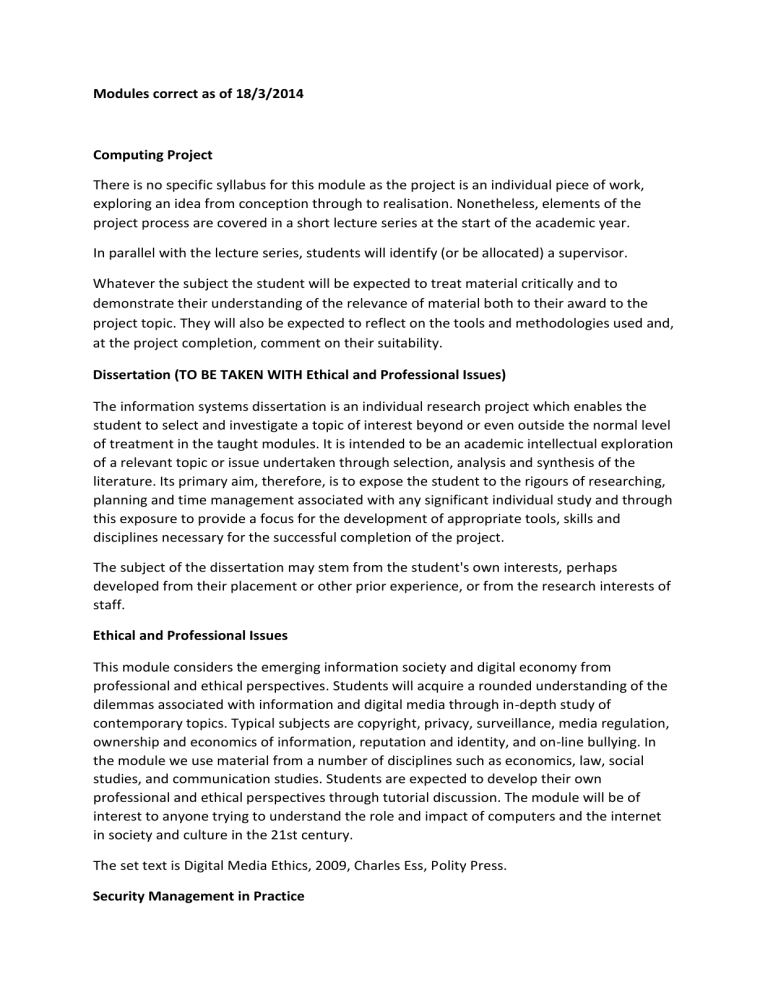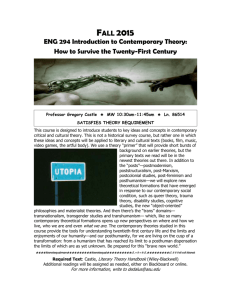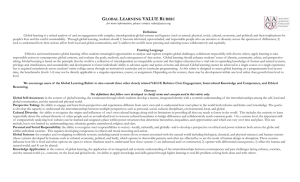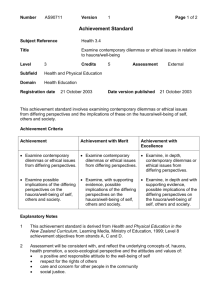Modules correct as of 18/3/2014 Computing Project There is no

Modules correct as of 18/3/2014
Computing Project
There is no specific syllabus for this module as the project is an individual piece of work, exploring an idea from conception through to realisation. Nonetheless, elements of the project process are covered in a short lecture series at the start of the academic year.
In parallel with the lecture series, students will identify (or be allocated) a supervisor.
Whatever the subject the student will be expected to treat material critically and to demonstrate their understanding of the relevance of material both to their award to the project topic. They will also be expected to reflect on the tools and methodologies used and, at the project completion, comment on their suitability.
Dissertation (TO BE TAKEN WITH Ethical and Professional Issues)
The information systems dissertation is an individual research project which enables the student to select and investigate a topic of interest beyond or even outside the normal level of treatment in the taught modules. It is intended to be an academic intellectual exploration of a relevant topic or issue undertaken through selection, analysis and synthesis of the literature. Its primary aim, therefore, is to expose the student to the rigours of researching, planning and time management associated with any significant individual study and through this exposure to provide a focus for the development of appropriate tools, skills and disciplines necessary for the successful completion of the project.
The subject of the dissertation may stem from the student's own interests, perhaps developed from their placement or other prior experience, or from the research interests of staff.
Ethical and Professional Issues
This module considers the emerging information society and digital economy from professional and ethical perspectives. Students will acquire a rounded understanding of the dilemmas associated with information and digital media through in-depth study of contemporary topics. Typical subjects are copyright, privacy, surveillance, media regulation, ownership and economics of information, reputation and identity, and on-line bullying. In the module we use material from a number of disciplines such as economics, law, social studies, and communication studies. Students are expected to develop their own professional and ethical perspectives through tutorial discussion. The module will be of interest to anyone trying to understand the role and impact of computers and the internet in society and culture in the 21st century.
The set text is Digital Media Ethics, 2009, Charles Ess, Polity Press.
Security Management in Practice
Software Security in the real world: Threats, costs and countermeasures
• Policies for managing security, policy languages and models
• Information Security Management Standards. ISO 2001/2002, Codes of Practice.
Legislation.
• Security analysis; assumptions made, social basis and threat assumptions.
• Analysing systems and security aware applications from various domains such as mobile communications, electronic commerce, banking and finance.
• Planning for an ISMS: Planning stages, understanding the organisation, - ways and means planning the “right” system.
• Trade-off between threats and countermeasures and the return on security investment
(RoSI).
• Information security risk assessment: risk analysis methods, risk treatment
• The interrelation and interdependency of security management and other system management activities and considerations such as:- Business Continuity Management,
Organizational Security, Asset Classification and Control, etc.
• Planning and managing a disaster recovery operation. Business Continuity Planning
Information Systems Development 3
A review of contemporary approaches to systems development and its methods, tools and practices. Frameworks for evaluating methodologies and choosing between them.
The architecture of dynamic web-based (Model-View-Controller) applications and their underlying standards tools and technologies e.g.: RDBMS, SQL, PHP, XHTML, XML, XSLT,
XMLSchema.
The components, tools and architectures of complex web-based and workflow systems; business process modelling and enactment; business process management.
Critical evaluation of the forces which shape the development process: organisational structure, technological possibilities, designer knowledge and presumptions, development under constraints.
The architecture of web based applications. Formulating problem specifications. Modelling and description of systems and applications. Methodologies, tools and techniques for the development of web based systems. The application of frames and patterns to systems development.
Advanced Topics in Web Development
The syllabus will combine compulsory web oriented and programming principles and an optional set of technology topics selected by students with tutor guidance
•
•
Compulsory coverage will include
Web and service-oriented architectures
Software architectures
•
•
Object-oriented programming for the web
An introduction to software design patterns
• an overview of web programming practices (model- and test-driven design, version control, load testing)
Mobile Application Development
Historical overview of mobile device technologies, hardware devices, software technologies, contemporary mobile device frameworks and operating systems, mobile device SDK integration and configuration, current hardware specifications, graphics device capabilities, networking technologies and associated protocols, deployment and testing, content delivery, commercial development considerations, licensing and copyright.
Cryptography
Review of background mathematics: modular arithmetic, gcd algorithms, factorization algorithms, functions, pseudo random generators,
• Historical ciphers: substitution, vignere & permutation ciphers, rotor machines and
Enigma
• Perfect secrecy, semantic security
• Stream ciphers, block ciphers, modes of operation, symmetric and asymmetric encryption, RSA. cryptographic hash functions, data integrity and digital signatures, authenticated encryption, authenticated key exchange
• Error correcting principles. Some important codes: Hamming codes, ReedSolomon, BCH, and Turbo codes.
Basic compression techniques: Huffman coding, LZW Compression
Business Innovation and Growth
The module is designed around three themes:
1 Strategies for growth
- Comprehension of business’s strategy for growth.
- Diagnostic skills – what is the current strategy in an organisation?
- Growth theories for SMEs, social enterprises and commercial.
- Growth strategy for large firms.
- Management of growth.
2 Innovation management:
- The nature and role of innovation in business growth.
- Managing the innovation process.
- The role of the manager/firm size in innovation.
3. Leadership and strategic planning in entrepreneurial context.
- Understanding the founder’s changing role as business grows
- Leadership theories.
- Impact of leadership on business vision, culture and strategy.
- Entrepreneurial strategies.
- Corporate Entrepreneurship.
Organisational Leadership
Experiential Learning Cycle
Early Leadership Theories,
LMX & Contingency Theories,
Transformational and Charismatic Leadership Theories, Distributed Leadership
Ethics and Authenticity in Leadership
Leadership, Gender and Diversity
Culture, Aesthetics and Leadership
Critical Approaches to Leadership
Leadership Development
Ethical and Professional Issues (if not taken in conjunction with IS)
This module considers the emerging information society and digital economy from professional and ethical perspectives. Students will acquire a rounded understanding of the dilemmas associated with information and digital media through in-depth study of
contemporary topics. Typical subjects are copyright, privacy, surveillance, media regulation, ownership and economics of information, reputation and identity, and on-line bullying. In the module we use material from a number of disciplines such as economics, law, social studies, and communication studies. Students are expected to develop their own professional and ethical perspectives through tutorial discussion. The module will be of interest to anyone trying to understand the role and impact of computers and the internet in society and culture in the 21st century.
The set text is Digital Media Ethics, 2009, Charles Ess, Polity Press.









